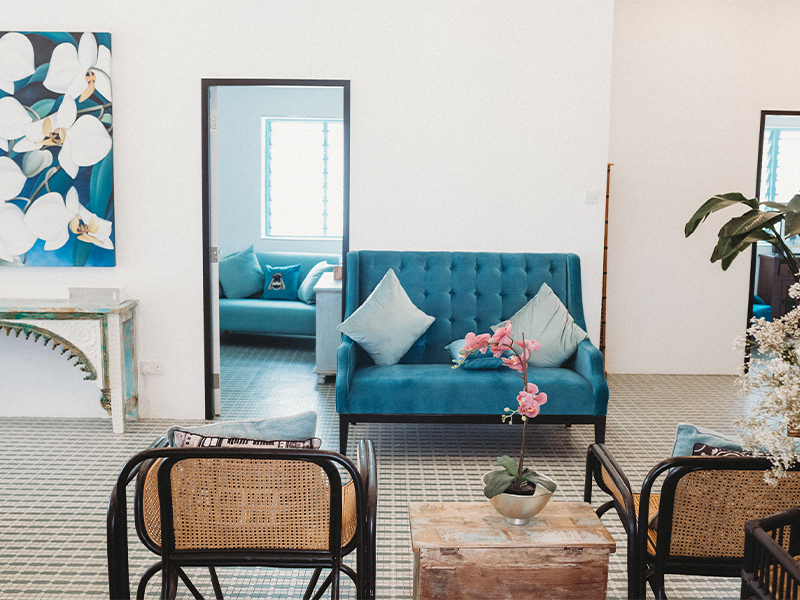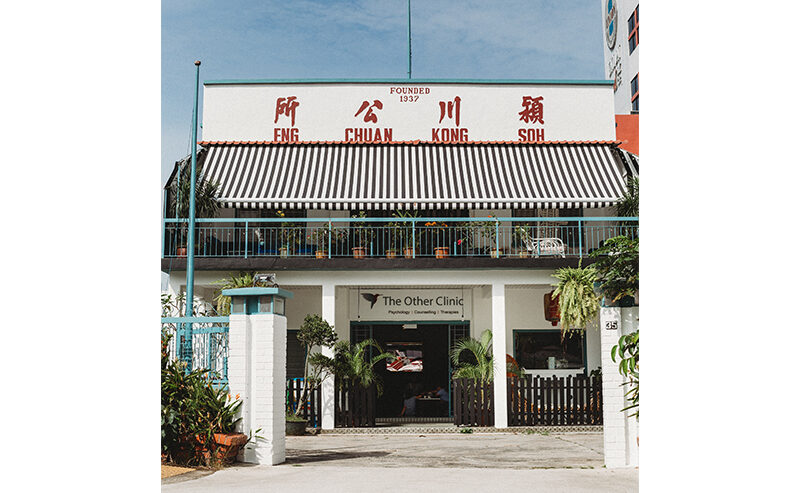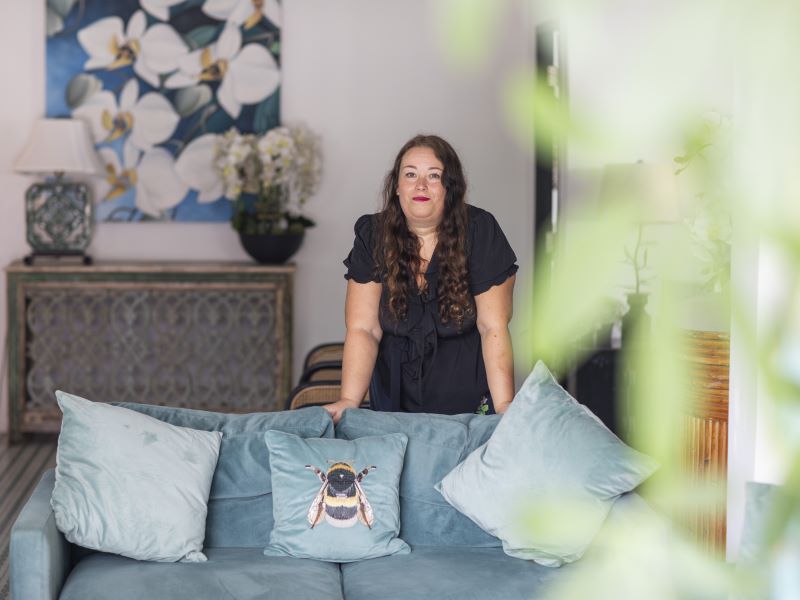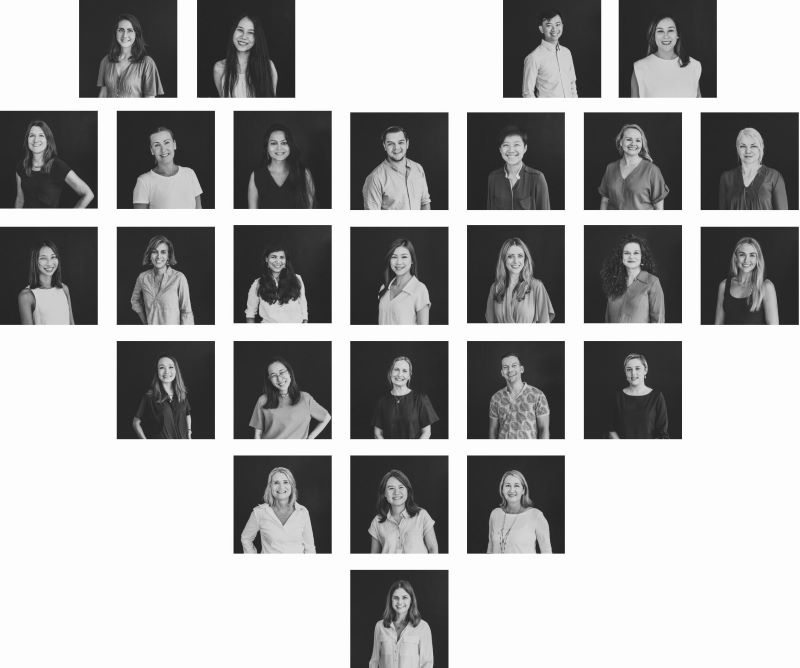Housed in a 1930s building in the heritage neighbourhood of Geylang, The Other Clinic (TOC) offers therapy in Singapore in an environment that feels akin to a relaxing family home with vintage touches – which is exactly the way DR RONINA (NINA) STEVENS envisioned it. If you’re looking for therapy sessions in Singapore, here’s what you can expect at this beautiful clinic.
Tell us about The Other Clinic’s unique location.
The clinic is within what used to be the Eng Chuan Kong Soh clan association house in Geylang. I loved the space the moment I saw it because it has a sense of calm and warmth. I felt there was something very therapeutic about renovating it as well. The space also has a rich history of providing cultural belonging, ritual and community – not to forget its own Lion Dance troupe!
Geylang is also a vibrant Malay and Chinese area with Peranakan shophouses hosting wonderful food with a slice of old school Singapore charm. It’s easy to get to and it’s a short distance from the CBD.
Therapy spaces can often be very formal and clinical looking, making you feel like you are waiting for an injection. I wanted TOC to feel more like a home. I want people to experience this Geylang clinic as friendly and professional.

What were some ideas that went into creating the finished space?
I spent time collecting furniture that would help a person feel relaxed. There are also lots of small touches like a drinks area, toys for the kids and charging stations. I’ve also created zones for different ages. I’m aware that parents have to wait for their children and need an area to work from or just relax in for a moment. Our outdoor deck gives people a moment to unwind so that they can be truly present in their session.
What are some of the most common mental health issues you notice when doing therapy in Singapore?
People here face a range of issues but in particular the fast pace and innovative nature of working life can give rise to increased anxiety, burnout and depression for some. I notice lots of “balancing acts”, with people being high achievers at work while trying their best at home. Some people are frequently away from family. In this competitive environment, people need a safe place and tools to succeed and thrive.

What are some of the barriers facing adults in Singapore who seek assistance for mental health issues?
Mental health has long been a stigmatised and perhaps even taboo subject. Historically, people perceived it as a sign of weakness or a character flaw. COVID-19 enabled people to start talking more about their mental health. In Singapore, physical health is well catered for and understood as important, but there is a growing need for “the other clinic” – one that supports our mental health. People are “othered” by society for their mental health, their neurodiversity and their sexuality.
Living in Singapore can often drive people to be high achieving and hard-working and this can create anxiety and pressure. And it has been harder for men to take that first step in getting help. At TOC, we aim to create a safe space where tending to your mental wellbeing is as natural as tending to your physical health.

Can you give us an overview of some of the services you offer?
We offer assessments, therapies and occupational therapy across the age range from children and teens to adults. We see couples and families, and we support companies and schools with their employee wellness. Our team is international so there is therapy delivered in different languages. We’re a clinic for all in Singapore. To widen our support we have clinicians in training supervised in our NEST programme (Nurturing, Evidence-Based Supportive Therapy) who can offer very low-cost options that make therapy more accessible.
What are some of the most common misconceptions about therapy sessions in Singapore?
People often think solely about mental illness when thinking about therapy, forgetting that mental health is part of everyone’s lives. The majority of people we see are stable but want to learn to manage their thoughts, emotions or relationships more effectively. It’s important to remember most mental health issues are treatable.
One myth is that therapy can take forever to bring change. The length of treatment depends on the severity of the issue, your motivation and the goals set. Many short-term approaches can be beneficial. In just six to 12 sessions a lot can be achieved. We are also trialling a single session therapy approach.
While some people have previously seen a therapist and found that it didn’t help, it’s important to remember that it might take a few sessions to feel comfortable or to learn that a person just wasn’t the right therapist for you. Don’t let it put you off – we can help find the right fit for you.
There are also some people who think that counsellors just sit, nod and say nothing. At TOC, the counsellors are active and engaged, wanting to move you toward your goals.
Finally, in couples therapy or family therapy, people can have the misconception that someone is always made to feel the “blamed one”. Our couple and family therapists focus on the relationship and patterns of both partners. They understand the dynamics and can improve communication. Couples work isn’t just about staying together; help with de-coupling can make separations less traumatic.

How would you encourage someone who is on the fence about going for their first therapy session in Singapore?
Therapy is a wonderful judgment-free zone for everyone including those without a mental health diagnosis. It’s a place to talk through life’s challenges – you can come when you feel ready to just try it. With busy lives, it can sometimes be hard to know where to start. Sometimes you need to talk about returning to work after maternity leave or the demands of getting a promotion. A big life event can benefit from a space to explore.
What can you expect when you begin therapy for the first time?
The first session is about getting to know one another, so at the beginning there will be more questions about what brought you to therapy and your situation. You don’t need to leap into your deepest, darkest worries but getting a sense of what you’re hoping for is a starting point. Therapy is a relationship as well and it takes a bit of time to feel trust and connection. It’s a very individual process and not every therapist is the right fit. It can be tiring. But if you can be open to therapy, it can be a great gift to yourself.
For more information about this unique clinic in Geylang, visit the website here.
The Other Clinic is at 35 Lorong 23 Geylang.
6957 9100 | hello@theotherclinic.sg
This article first appeared in the December 2023 edition of Expat Living. You can purchase the latest issue or subscribe so you never miss a copy!
To make the most of living in Singapore, read our latest City Guide here for free!





